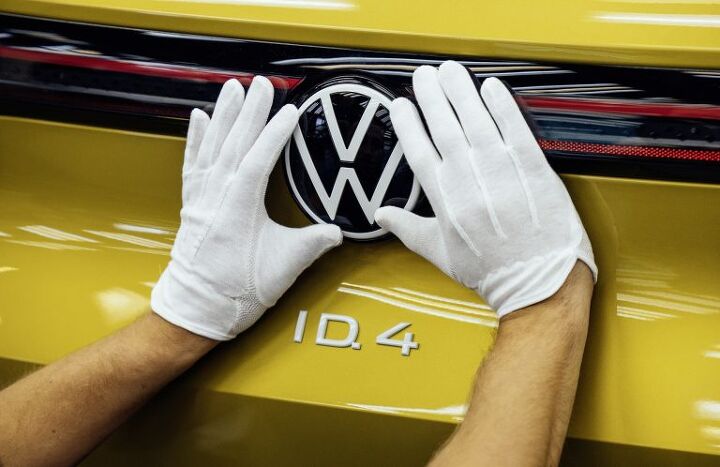Volkswagen Reportedly Buying Carbon Credits From Tesla China

One of Volkswagen’s joint ventures in China has reportedly offered to purchase regulatory credits from Tesla in order to adhere to the regional environmental ascendancy. While VW may be doing everything in its power to swap over to an electric-vehicle manufacturer, it’s apparently falling short of government dictums.
FAW-Volkswagen — which shipped a little over 2 million automobiles in Asia last year — happened to be one of the biggest polluters of 2020 according to China’s Ministry of Industry and Information Technology. As it turns out, selling internal combustion vehicles consumers actually want to purchase in large quantities has some kind of environmental cost. Fortunately, it’s one regulators think can be solved by buying green credits from rivals who do all of their polluting during the initial assembly process and launder any future emissions through the national energy grid.
Reuters, which broke the story, stated that it’s currently unclear how many credits FAW-Volkswagen will need to purchase from Tesla. But the price was estimated to be around 3,000 yuan (about $450) per credit and is reportedly higher than previous years. While the per-credit estimate doesn’t make it sound like there’s much money in the practice, Tesla’s 2020 revenue just from selling regulatory credits totaled $1.58 billion and ensured that it turned a profit.
From Reuters:
China, the world’s biggest auto market where over 25 million vehicles were sold last year, runs a credit system that encourages automakers to work towards a cleaner future by, for example, improving fuel efficiency or making more electric cars.
Manufacturers are awarded green credits that can be offset against negative credits for producing more polluting vehicles. They can also buy green credits to ensure compliance with overall targets, though trade is usually between affiliated companies that share a major stakeholder.
The irony of the situation wasn’t lost on us. Despite China having fairly rigid emission laws for automakers, the country itself has the sweetest deal imaginable in the Paris Climate Agreement. Unlike other nations of its size and level of development, China’s reduction targets don’t come into play until 2030 even though it’s typically producing more carbon dioxide than the United States and European Union combined. The U.S. has even managed to reduce its emissions rather dramatically over the last decade while China has been building more coal-fired powerplants to maintain its energy needs. But it’s also building more EVs and automakers believe they can avoid future penalties by transitioning toward becoming totally electric marquees, which is ultimately what China (and other nations) seems to want.
[Image: Volkswagen Group]

A staunch consumer advocate tracking industry trends and regulation. Before joining TTAC, Matt spent a decade working for marketing and research firms based in NYC. Clients included several of the world’s largest automakers, global tire brands, and aftermarket part suppliers. Dissatisfied with the corporate world and resentful of having to wear suits everyday, he pivoted to writing about cars. Since then, that man has become an ardent supporter of the right-to-repair movement, been interviewed on the auto industry by national radio broadcasts, driven more rental cars than anyone ever should, participated in amateur rallying events, and received the requisite minimum training as sanctioned by the SCCA. Handy with a wrench, Matt grew up surrounded by Detroit auto workers and managed to get a pizza delivery job before he was legally eligible. He later found himself driving box trucks through Manhattan, guaranteeing future sympathy for actual truckers. He continues to conduct research pertaining to the automotive sector as an independent contractor and has since moved back to his native Michigan, closer to where the cars are born. A contrarian, Matt claims to prefer understeer — stating that front and all-wheel drive vehicles cater best to his driving style.
More by Matt Posky
Latest Car Reviews
Read moreLatest Product Reviews
Read moreRecent Comments
- Kwik_Shift_Pro4X Mazda CX-5 all the way.
- FreedMike CX-5 for the win, even in base version. 1) Far better looking. 2) Mazda dealers will actually give you a decent deal on the CX-5; Toyota dealers still think it's 2021 and are trying to get over sticker.
- Ajla 1. RAV4 hybrid 2. CX-5 2.5L3. CX-5 Turbo4. RAV4 2.5L5. RAV4 Prime
- Ajla When the Gladiator was introduced FCA said engine cooling is why they didn't use offer the 2.0T and why the Ecodiesel had a lower tow rating than the 3.6L. I'm interested if they actually solved that here or if we'll see the 4xe given a considerably lower tow rating.
- Funky D There are WAY too many of what my youngest son calls grayscale (white, black, silver, gray) out there.I will pick literally ANY color (including that baby puke yellow found on new Chevy crossovers) over a grayscale color. But if every car I had was arrest-me red, I'd be find with that.What happened to the 60s~80s when you could choose from a pretty rich color palate when placing your new car order?


































Comments
Join the conversation
If you are really concerned about the environmental impact of manufacturing a vehicle then you would keep what you have for a longer period of time. Most people do not even think of the environmental impact of manufacturing a product.
@mcs--I haven't gone to EVs yet but I keep my vehicles for over 10 years not because environmental reasons. There are consequences to the environment for making most things. I will at some point own an EV but for now I am happy with what I have. The ever increasing complexity of ICE vehicles with turbo 3s and 4s and CVTs and multi-geared automatics will give me more incentive to eventually buy an EV.